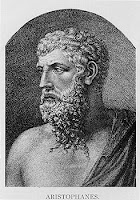 |
| "Greece" |
Greek history began around 700 BC honoring their gods with many festivals. A god, Dionysus, was honored with an unusual call Dionysus festival city. Orgy-filled festival was dressed from goat skins beat people into managed (because goats have strong sexual thoughts), who sings and plays the choruses to welcome Dionysus. Tribes competed against each other in shows, and the best performance will have the honor of winning the competition. City Dionysus - Of the four festivals of Athens (each reflecting seasonal changes) were only presented plays at a festival. Historians believe that the Greeks modeled their traditional feasts in honor of Osiris after the Egyptian competitions.
In early Greek festivals, the actors, directors and playwrights all the same person. Later only three actors to be used in each game. After a time, was non-speaking roles allowed to perform on stage. Because of the limited number of players allowed on the stage, the choir has developed into a very active part of the Greek theater. Although the number of people in the choir is not clear, the choir made as many as half of the total lines of the play. Music was often played during the chorus' delivery of their lines.
Although few tragedies written in this period remains in fact, the themes Greek tragedy and achievements still resonate with modern audiences. Tragedy term (drag and ODA) literally means "goat song," that goat-like dance festival-goers around the goat sacrifice for prizes. Most Greek tragedies are based on mythology or history and deal with characters seeking the meaning of life and nature gods. Most of the tragedies that have survived from this period begins with a prologue that provides the following measures published specifications. The chorus then into a period called the paradox. During this time the character introductions are made, the specification given and a state of mind is established. The last phase is called the exodus when all the signs and turn chorus.
Three well-known Greek tragedy playwrights of the fifth century are Sophocles and Euripides. Aeschylus, who was a rival city of Dionysus around 499 BC, wrote some of the oldest tragedies in the world. Only a few of Aeschylus's plays have survived, but they include Persians and Oresteia trilogy. Aeschylus is attributed with introducing actor in stage two. Another Greek playwright was Sophocles, only seven of his tragedies - including the still popular Antigone, Electra, and Oedipus Rex - have survived. Sophocles won noon contests for his pieces for the theater, never placing lower than second place. His contribution to theater history are numerous: he introduced the third stage actor, determines the number of choir members to fifteen years, and was first to use the painting stage. Euripides was a prolific writer who believed that he wrote parts 90, 18 of which have survived, including Medea, Hercules and the Trojan women. He was often criticized for the way he challenged the traditional values of the stage. Euripides also explored the psychological motivations of characters actions have not been explored by other authors. His plays have been used as a model for other authors for several years after his death.
Comedy was also an important part of ancient Greek theater. No one is quite sure of the origins of comedy, but is said to have derived from imitation. All notes in this period, the comedies of Aristophanes. Aristophanes, who competed in the great Athenian festivals, wrote 40 songs, 11 of which have survived - including the most controversial part of the literature that comes from ancient Greece, Lysistrata, a humorous story about a strong woman as female lead a coalition to end the war in Greece. Although only 33 comedies and 11 tragedies lie in such a creative period, the Greeks were responsible for the birth of drama in the Western world.

No comments:
Post a Comment